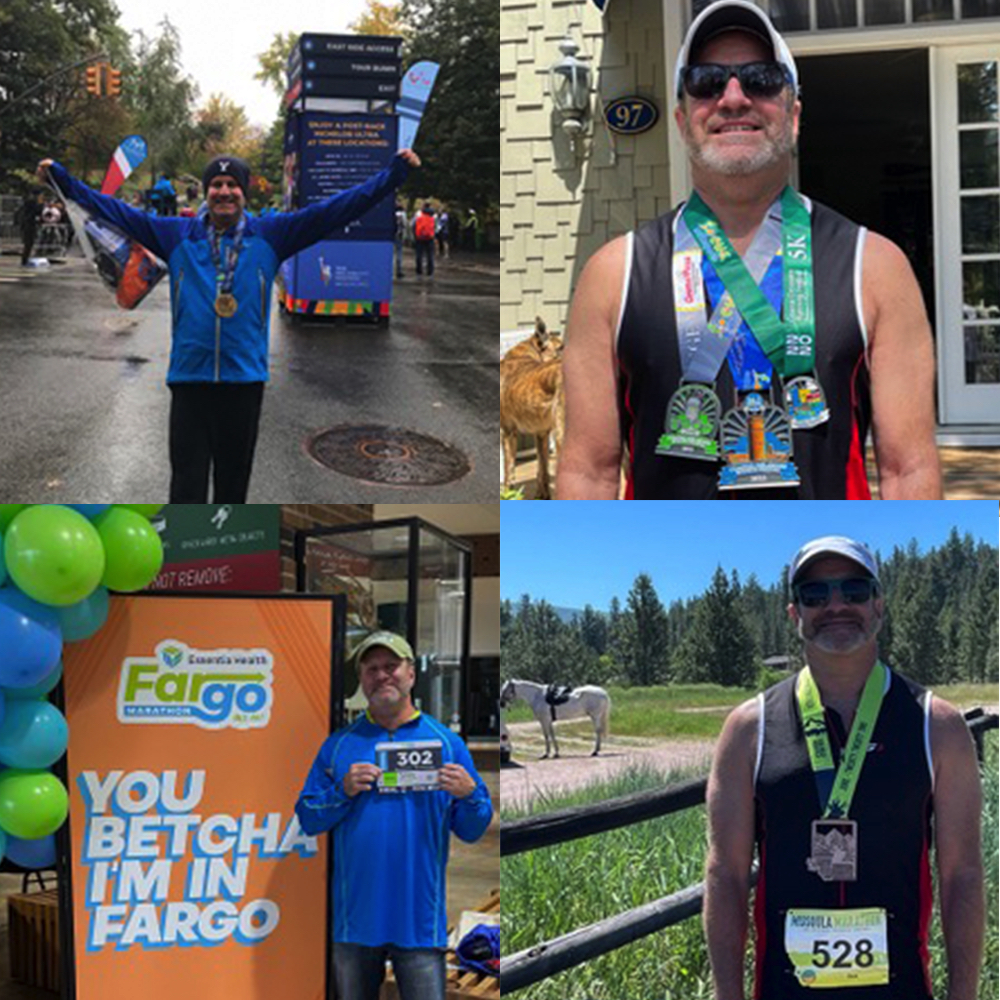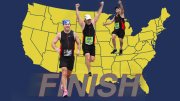Scott Kline, J.D. ’88, thought he might run fast in the Hartford Marathon. Not fast fast, but fast for a 60-year-old retired lawyer. The early November weather in Connecticut was supposed to be mild, and he was feeling well-rested despite having run two other marathons within a few weeks. Maybe, if his legs allowed it, he could run close to a personal record.
Then Kline scrapped the plan. It wasn’t that his goal was impossible, but it wasn’t the point. He had never been a great runner or even, really, a good one. What he had done was complete a marathon in 49 of 50 states. The Hartford one would get him to 50. If slowing down meant he could enjoy it a bit, that was fine.
Kline had run his first marathon—the 1987 Boston Marathon—on a lark. His friend, a fellow second-year law student, had gotten a free bid from the Harvard Running Club and encouraged Kline and some friends to run, too. Unlike today, the race had no hefty entry fee, time cut-off, or fundraising threshold. The 23-year-old Kline just signed up and started some haphazard training with two classmates. They embarked on 15-mile runs with no water stops (“we didn’t know those were a thing”) nor fancy nutritional supplements. “Plus, it was in the middle of winter,” Kline said. “We didn’t have anywhere to train, so we were just slipping on ice.” He managed to finish the marathon anyway. Though he’d never seen the city as particularly welcoming or friendly as a student, the thousands of people cheering on his 10-minute miles shifted his perspective. “It gave me a much warmer view of Boston,” he said, “and that really stayed with me all this time.”
One marathon completed, Kline took an unplanned 26-year break. He finished his clerkship. He got his law degree. He worked for many years as an attorney representing technology companies. He got married, settled in Dallas, Texas, and raised three children. He felt grateful that he could retire in his fifties. And then, like many other Harvard graduates with a bit too much free time, he set his eyes on running very long distances.
He first aimed for the 2013 Dallas Marathon, but it was canceled last-minute due to an ice storm. Fixated on running that day and unaware that he could sign up for plenty of nearby races in the following weeks, he flew to Las Vegas and entered the Hoover Dam Marathon. The event was a trail race, he learned—with more rugged terrain and hills than a typical road marathon—and he ran much slower than he’d hoped. But it was fun, and he was proud of himself. He signed up for another marathon, then another.

Sometimes, he’d head to some of the biggest marathons in the world: New York, Chicago. More often, he was one of the few out-of-state participants in a small charity race. At the 2020 Holy Family Memorial Maritime Marathon in Manitowoc, Wisconsin, about two dozen race volunteers and participants were sufficiently amused that someone from Dallas had entered “Wisconsin’s premier east coast marathon” that they called him “Tex” and waited at the finish line to cheer him on. In Shenandoah, Iowa, his 26 miles felt like “running through the Field of Dreams movie.”
The connections he made with other runners surprised him. On the news, he’d gotten used to hearing how divided the country was—how few common values people held across state lines. Then, he’d head to the Mississippi River Marathon and a race volunteer would offer him a room in her own home upon hearing that Kline’s hotel was overbooked. “I’m a fairly cynical guy,” Kline said. “And it just took me a while to kind of accept that there wasn’t a quid pro quo angle to this. People were just really happy that you came to see their city and learn about and support their charity.”
It was this spirit that drove Kline toward more marathons in more states—and away from worrying too much about his speed. Once he reached 15 states in 2019, he started thinking about doing all 50. When he got to 30 in 2021, he stepped up his efforts.
Click on each shoe in the interactive map below to view Scott Kline's marathon dates:
In 2022, he clicked off 11 marathons in 12 months. During his final race that year in West Virginia, a fellow runner introduced himself and told Kline that he was cramping up. The pair ran the next 13 miles together, and Kline tried to keep his new friend’s mind off the cramp. It turned out that the man, Michael Corbett, had run dozens of marathons himself and was just having a bad day. They finished together in four hours, 55 minutes and stayed in contact. A few months later, when Kline told Corbett that he planned to finish the 50-state challenge in Hartford, Corbett asked if he could help him out. “It’s kind of a thank you,” he told Kline, “for what you did for me.”
Hartford was not necessarily a glamorous locale for a final marathon (Hawaii, Kline’s forty-third, and Alaska, his forty-seventh, could have provided more scenic conclusions), but the road to 50 wasn’t pretty either. Lots of travel. Many hotels. A broken foot. But he finished with Corbett at his side and with his wife and some close friends in attendance. He was thankful that Corbett convinced him not to push the pace for his final state. “By the time we got to the end,” he said, “I was completely gassed.”
Kline will run Boston again in April, the race that got him started. He imagines it will be a surreal experience: running the same course as a 60-year-old that he did when he was 23, unmarried, and without children. His kids are grown now, and he recently became a grandfather. He’s looking forward to giving his body a bit more rest now that the 50 states are done. But for now, there’s one more race to go—for old time’s sake.









